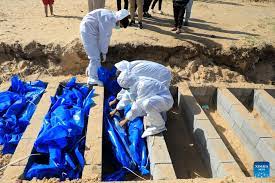As Myanmar’s national COVID-19 response collapses following a February 1 military coup, one ethnic armed organisation in the country’s north has quietly vaccinated 20,000 people in areas it governs, with support from across the border in China.
The vaccines, produced by the Chinese company Sinovac Biotech, were supplied and administered with assistance from the Red Cross Society of China, a member of the International Federation of Red Cross and Red Crescent Societies.
The KIO is one of approximately 20 ethnic armed organisations operating along Myanmar’s borders with China, Thailand and India. Several of them have run their own COVID-19 responses from early on in the pandemic.
Although the turmoil and intensifying civil war since the coup have disrupted their efforts, the KIO and Karen National Union (KNU), two of the country’s most well-established ethnic armed organisations, told Al Jazeera that they were continuing as much as possible.
Their ongoing COVID-19 responses come as Myanmar’s national healthcare system – already one of the weakest in the world before the coup – falls apart. Days after the coup, government health workers initiated a Civil Disobedience Movement, which has now swept the country, in an attempt to paralyse military rule and starve the generals of resources. Many hospitals are closed or barely functioning.
On May 5, the United Nations in Myanmar warned that attacks on medical personnel and facilities were jeopardising the COVID-19 response.
“At a time when Myanmar needs them the most, health workers fear arrest or detention for exercising their rights to freedom of expression and peaceful assembly,” it said in a news release.
According to the UN, the military has committed at least 158 attacks on medical personnel and facilities, in which more than 60 people have been injured or killed. Additionally, it has arrested and charged more than 139 doctors and occupied at least 50 health facilities.
Dr Khin Khin Gyi, head of the health ministry’s infectious diseases unit, told Voice of America in early April that national testing rates had fallen to less than 2,000 a day, from as many as 25,000 daily tests before the coup.
Reported cases have subsequently plummeted.
As of January 31, the country had documented more than 140,000 cases and 3,131 deaths, and was reporting hundreds of new cases daily. Since the coup, however, only 2,700 new cases – averaging about 30 a day – and 79 deaths have been announced.
‘Perfect storm’
The International Federation of Red Cross and Red Crescent societies warned in an April 1 statement of a possible “perfect storm” in which a coronavirus outbreak could coincide with the country’s ongoing humanitarian crisis. Although no outbreak has been detected in Myanmar since the coup, India and Thailand are currently experiencing major new waves of the virus.
On Myanmar’s southeastern border with Thailand, the KNU, which was established in 1947 and joined a Nationwide Ceasefire Agreement in 2015, has operated a Pandemic Emergency Response Team across its seven districts since March 2020.
According to Saw Diamond Khin, who heads the KNU’s Karen Department of Health and Welfare, testing capacities are limited – up to 18 tests a day, and only at one location – but of those tested, only three cases have been identified since the beginning of the pandemic.
He told Al Jazeera that population movement had been minimal until the coup. “People have not travelled much during the pandemic except for to and from their farms. Our area is mountainous; people only leave the village to buy items like salt.”
The coup, however, has dramatically increased movement into KNU areas.
In February, the KNU offered anti-coup protesters its protection, and thousands of dissidents and striking government workers have since sought shelter in its territory. Others are arriving from cities to train to take up arms against the military.
“Before the coup, communities lived separately. We didn’t cross from one village to another. Now, people are running here and there,” said Saw Diamond Khin. “The main thing is that people from cities are coming to us. We register them first and send them to a quarantine centre.” Air raids and escalating clashes have also forced at least 40,000 civilians from their homes, many of whom are hiding in the jungle.



